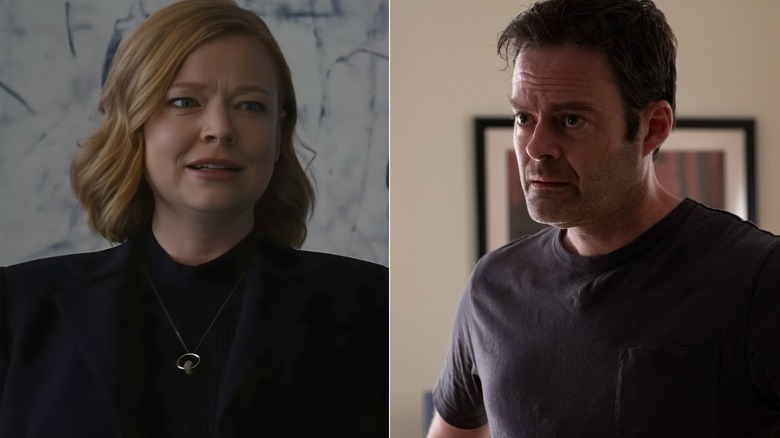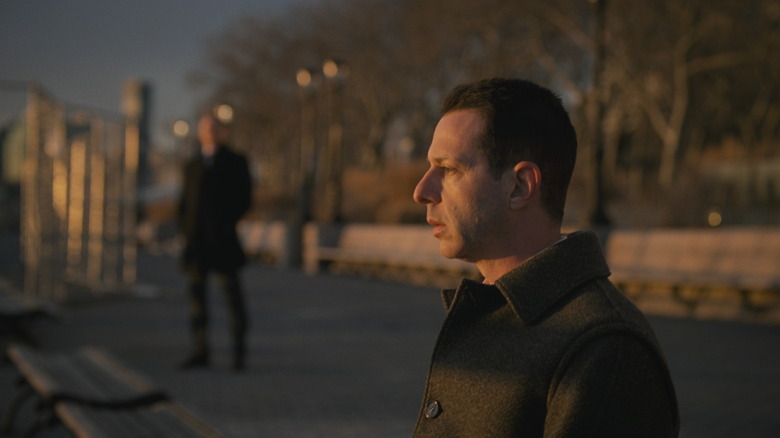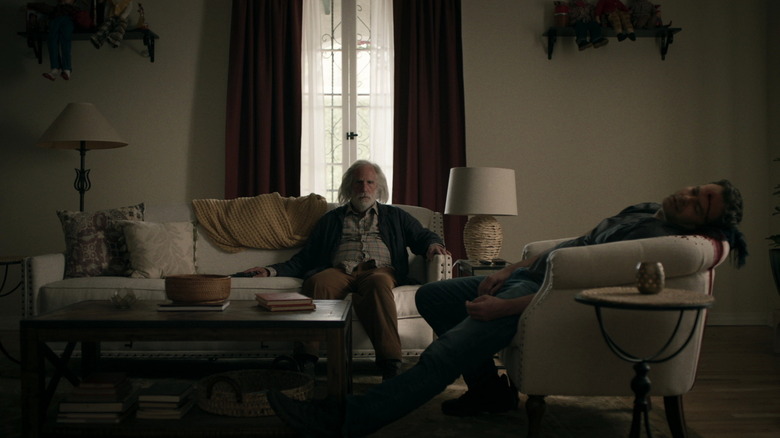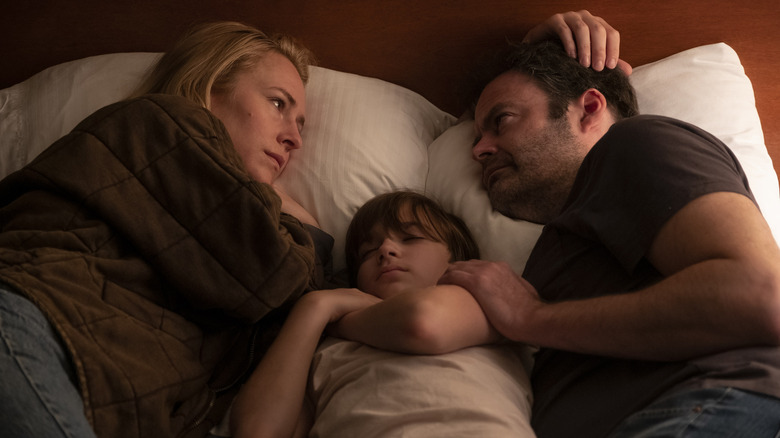Succession Vs Barry: Which Had The Better Series Finale?
Contains spoilers for "Succession" and "Barry"
It's the Roy siblings vs. Barry Block.
HBO delivered one of the most exciting nights of television by airing the season finales of both "Succession" and "Barry" back-to-back. Both shows debuted weeks apart from one another in 2018, quickly becoming the network's must-watch projects. While "Succession" served as HBO's go-to "Game of Thrones" replacement, "Barry" emerged as one of the network's strangest and funniest additions. Fanatical online followings and Emmys manifested, turning the projects into two jewels to add to HBO's crown.
While both shows follow vastly different worlds and characters, their similarities are clear. Both HBO projects started off as morbid comedies highlighting a specific, nuanced group of people ready to claw their way to the top of their respective professions. Along the way, each series morphed into deep psychological studies about trauma and the perils of ambition and ego — typical HBO stuff. And by the end of their run, both "Succession" and "Barry" were obsessed with ideas surrounding legacy and the struggles of maintaining one. It's fascinating to see just how much the two shows have evolved in the last half-decade, veering into bleak and disturbing territory as they came to a close.
Singular, auteur-driven ideas, "Barry" and "Succession," will always stand out as the perfect end to an incredible era for HBO. As a new generation of shows kicks off, it's certain that they'll always be in the shadows of the bold "Barry" and sardonic "Succession." While both finales have proven to be controversial, they've succeeded in closing out their respective arcs and narrative threads, effortlessly claiming their own place in the conversation surrounding perfect finales.
When it comes to the best finale that aired on May 28, it's obvious that there's a winner between "Succession" and "Barry."
Succession's finale was exactly what audiences needed
"Succession" is a show that could have gone on forever. The death of Logan Roy (Brian Cox) could have been the start of a new chapter for the Roy siblings, each attempting to fight their way to the top. While Season 4 of "Succession" wasn't rushed, it's easy to imagine how it could have gone on longer, prolonging Matsson's (Alexander Skarsgård) rift with the siblings, veering into hostile takeover territory.
Instead of turning into a soap opera, series creator Jesse Armstrong wrapped his family drama up with a devastating finale that explicitly reminded folks that the Roys are not good people worth rooting for. The final half-hour, largely focused on the Waystar Royco x GoJo takeover vote, was the perfect setpiece that allowed Armstrong and director Mark Mylod to make incisions into the Roy trio, allowing their true natures to manifest. They all buckle under pressure and their own insecurities, resulting in a Kendall (Jeremy Strong) meltdown that's one for the ages.
The confidence in letting the siblings be each other's downfall, especially after the empathetic and heartwarming kitchen scene, cemented the "Succession" finale as one of television's greatest. Audiences got exactly what they wanted, the Roys enjoying themselves, (briefly) free from their father's shadow, followed by what they needed: the realization that becoming CEO and "winning" is ultimately meaningless. There's no need to continue a legacy that's proven to be rotten to its core. The kids will never be Logan Roy and now that they're free from that notion, finding themselves stuck in their own personal hells, with billions of dollars to blow.
Even if Armstrong decided to push the series for more seasons, "Succession" simply had to end that way and there was no other way around it.
Barry's finale was a cruel triumph
From a quirky action-comedy about a hitman trying to become Hollywood's next big thing to a dark, revenge-obsessed absurdist nightmare, it's been difficult to put "Barry" in a box. Like "Succession," Barry ended with its lead character realizing that it's truly over: there's no way redemption or success is possible — you have to deal with the hand you're dealt. As Kendall (Strong) swallows the bitter pill that he'll never be his dad, Barry (Bill Hader) acknowledges that his world of delusion is no longer the safe, hopeful place it once was. Not even God can save the hitman-turned-actor-turned-hopeful-dad from meeting his fate: a headshot from Gene (Henry Winkler).
But Barry's lack of redemption is just one side of the finale, which Hader expertly directs. From hurling away fan expectations of a chaotic final battle involving Barry and Hank (Anthony Carrigan) or a showdown with Fuches (Stephen Root), the finale was obsessed with undermining its lead character and pointing out the raw, unbearable consequences of his actions... only to turn him into a hero.
The finale rewrites the entire show. Somewhere along the way, Hader's priorities with "Barry" shifted, no longer interested in examining the world of Hollywood and the egos that populate it. Instead, Hader became invested in the idea of legacy and reputation, and how it can be twisted through subtle acts of violence and public perception. While Hollywood continues to pump out projects of cruel men finding salvation through the sacrificial death, "Barry" sneers and mocks at this idea, giving its titular character a death so pathetic and anti-climactic that audiences can't help but repeat the character's final words: "oh wow."
But it's an ending that isn't interested in death, but rather the stories we create to maintain a legacy.
Barry picked the best possible ending for its titular character
"Succession" and "Barry" both delivered outstanding finales that audiences will continue to discuss for decades. Each ending felt authentic to its start and premise, never interested in creating tension or drama for the sake of it. There were no major twists. Or cheeky, wink-heavy nods of fan service. They wrapped up as best as they could, delivering devastating finales that felt natural and conclusive.
A finale should satisfy but also expand upon what has come before it, adding shades of depth and nuance that make the entire series feel more whole. "Succession" did that, but it was "Barry" that transcended its own narrative, turning into an entirely different beast with its shocking and damning epilogue. If "Succession's" finale was heartbreaking, then "Barry's" was a cord pull to a slowly beating, vegetative heart, grasping for more life. In the show's final moments, we see Bill Hader dissect Hollywood's obsession with violence and the military and how the truth is just a jumping-off point to tell a more interesting story.
Barry is a bad, selfish man who emerges as a hero to his son. And that's just showbiz, baby. As mind-boggling as that choice is, it's interesting to see how "Barry" didn't need to end that way. There are dozens of ways "Barry" could have ended, with him dead or alive, redeemed or scorned. Instead, it gave audiences both endings: he dies a loser but emerges redeemed on the silver screen, with history rewritten to compliment his obsession with maintaining a legacy worth celebrating. As perfect as "Succession" was, its catastrophic call to curtains was pre-destined because each character was cyclical in nature and action.
Both "Barry" and "Succession" ended on their own terms, just not in the way we expected.



